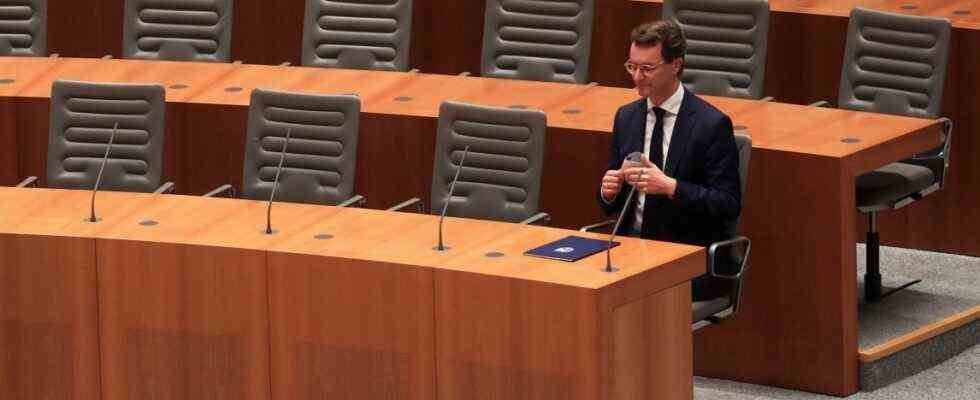So now he is the face of the West. Hendrik Wüst did it: The Düsseldorf state parliament elected the man from the Münsterland as prime minister on Wednesday afternoon, even with three votes more than necessary. He is right at the front – in the country, in the CDU, and also in the republic; that’s the way it is when you rule the most populous federal state. The only thing that already applies now is that if the newcomer just carried on like the old one, he would lead his CDU into a disaster in May of next year, similar to Armin Laschet just now in the Bund. He would go down in national history as the head of government with the shortest term of office of all, as an episode.
State elections are lurking in North Rhine-Westphalia in just seven months. The Laschet cabinet, which Wüst is now taking over almost unchanged, has achieved successes: crime is falling, and NRW has caught up in terms of growth and jobs. In the west, more roads are being repaired and more new cycle paths are being built than ever before, and the liberal policy on foreigners is advancing to become the draft of traffic lights in the federal government. Armin, the father of the country, has achieved more at home than Laschet, the nationally mocked candidate for chancellor, would have guessed.
Actually, people were satisfied with Laschet for a long time
But this legacy is now poisoned. As an aspirant for higher things, Laschet drove the image of his entire state government into the abyss. If the NRW citizens were allowed to vote now, according to the WDR survey, black and yellow would be chased out of office and red and green would return to the ministries (after only five years of opposition). As a reminder: just 18 months ago, 65 percent of those surveyed were satisfied with Laschet. Today, however, every second Rhinelander and Westphalian interpret their legacy negatively.
Much can still change by May. The NRW-SPD, fragile for many years, currently feels like Lazarus: Olaf Scholz has breathed new life into it. But nobody knows whether Thomas Kutschaty, the still largely unknown party and parliamentary group leader, will actually be able to lead the Social Democrats to victory. Many of the weaknesses that plague NRW are rightly chalked up to the Reds and Greens.
So everything remains open. Also for Wüst. He now has to show that the generation change from 60-year-old Laschet to him, the 46-year-old, also means change. “Measure and middle,” the motto of his predecessor, who always moderated, does not fit in with the dashing, previously often cutting style of Wüst. The man after Laschet has to set his own accents – for his own profile, for the good of the country. Three examples.
Three big topics: reconstruction, climate protection, education
Thousands of people who were hit by the flood in the summer urgently need a signal for such a new beginning. There is enough money (from Berlin). But the reconstruction is only progressing slowly because the town halls of the devastated cities and in some state authorities simply lack the staff for aid applications and building permits. Or because in the midst of the destruction those laws continue to apply that delay planning and block investments even in an ideal world. Wüst, previously Minister for Transport and Infrastructure, knows this thicket. He could shake things up, urge hundreds of administrative experts to show solidarity with an appeal (and bonuses) – and order them to temporarily suspend overly perfectionist national rules.
Other things would take more time – but would also be a sign of repentance. Example of climate protection. In North Rhine-Westphalia, lignite excavators dig barely a hundred meters away from villages, and the Datteln IV fossil-fuel power plant is humming 500 meters away from residential buildings. However, the black and yellow government is slowing down the construction of new wind turbines by requiring a minimum distance of one kilometer from each settlement. You don’t have to be a green person to look black: This course blocks the industrial state of North Rhine-Westphalia from access to inexpensive green electricity – and to an earlier coal phase-out.
It would be even more courageous if Wüst would remember what drove him into politics thirty years ago: The pupil at the time annoyed how friends from Bavaria blasphemed the supposedly inferior NRW high school diploma and bad education. Especially in the Ruhr area, many school buildings have run down today, with thousands of teachers missing, especially for the youngest. It is not the hard work and intelligence of the students, but where they come from and where they live, that make a huge difference in life chances. That is class education. And NRW is still the federal state that invests the least per capita in the schooling of its children. To finally change that is not only a requirement of social justice – it is necessary to preserve the economic future and the cohesion of society.
Reconstruction, climate protection, education: three examples where Hendrik Wüst can show more ambition than he was allowed to reveal as a solid minister under Laschet. He will think bigger, have to venture out more – or meekly step aside in May.

